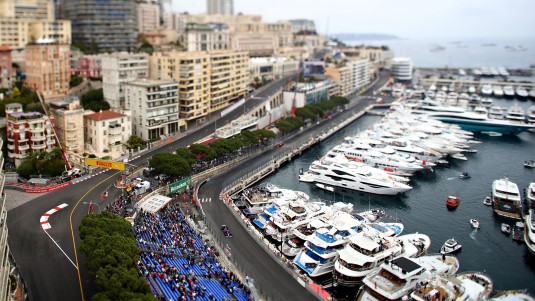
There's little need to go into the ins and outs of the baubles dangled before the viewers' eyes. Supercars with ostentatious paint jobs, petty competition between billionaire yacht owners for ever larger vessels, palatial rooms at the Hotel de Paris going for 15,000 Euros a night, and the zero income tax that, as the narrator put it, helps "protect the substantial family fortune." Then we have the exclusive parties, the invite-only gatherings up at the Royal palace, and the master of ceremonies himself, Prince Albert II of Monaco - the only absolutist monarch on history in possession of an American accent. It's the sociology matters, the glimpses of the principality's power relationships.
Albert affects a patrician if avuncular presence at odds with his and Princess Stephanie's hard-living reputations from the 80s and 90s, but his word is law. There is a no photography rule in Monaco, and professional photos or filming requires written permission - hence no paps, another bonus for harried celebrities considering residence. He also gets to decide who can become a Monegasque citizen, of which there are 9,000. The programme makes much of the elaborate hoops one has to jump through to tick the boxes, but it's very clear the (unspecified) rules are a complete sham - Albert decides all applications, and if your face doesn't fit you're not coming in. Citizenship does confer advantages though. Even a state given over to the indolence of the leisure class needs workers, and a relatively generous system of subsidies are available to citizens. As one air traffic controller observes, his citizenship means he pays 700 Euros per month for his apartment whose market rate would ordinarily be €4,000/month.
Monaco however is entirely dependent on the circuits of the globe-trotting rich, as well as the sufferance of the French state. Revenues are funded by the 20% VAT the state levies on everything, which makes spectacles like the Monaco Grand Prix essential money spinners. But there is a problem: with the rise of the likes of Dubai as another luxurious hold out for the rich, how might the principality stay competitive and keep the cash flowing? Princess Camilla, consort of the Duke of Castro and one of the claimants to the long abolished and disputed throne of the Two Sicilies is determined to "preserve tradition" and come up with new ways of making Monaco relevant. Her wheeze? Influencer awards. For a micro state whose social basis rests on discretion, inserting Monaco into the overexposure of the attention economy can bring in the next generation of money bags. By getting the images of the awards and the lavish hospitality out to tens of millions of followers, Monaco hits the aspirational imaginary and the whole grift can carry on indefinitely.
Monaco's opulence is grotesque and, not at all coincidentally, showcases the poverty of bourgeois success. The dream of capital is accumulation without workers nor the responsibility for their maintenance. The dream of power is control without accountability, and therefore responsibility. Monaco marries the libertarianism of the super wealthy with the arbitrariness of absolutism, and they are shown to be the conditions for one another. The other two key tax haven states, Dubai and Singapore, have near identical set ups - the only real difference being the degree to which they ratchet up the authoritarianism. And this, ultimately, underlines the pointlessness of wealth. Fortune liberates one from economic necessity, but the freedom excessive money buys is luxury behind closed doors, a berth in a rarefied society of artifice and superficiality. When you consider all the crap the ruling class inflicts and the destruction of human beings their system affects - just so they can recline in the bounded universe of gilded gated communities - doesn't it make you feel sick?
Don't be too pessimistic about change there. Monaco did have a successful workers revolution in 1911, and what goes round comes round, as you know. https://en.wikipedia.org/wiki/Monégasque_Revolution
ReplyDeleteHere here!
ReplyDelete